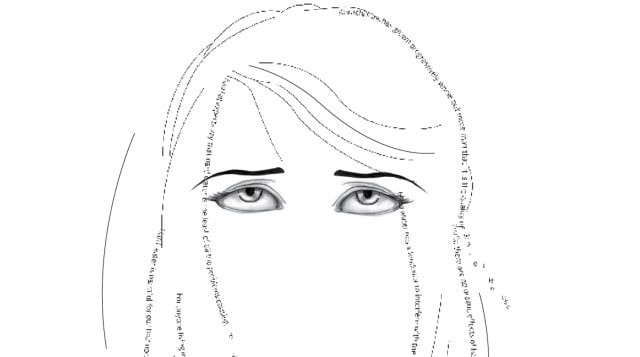Cutting your daughter into pieces – for speaking up
Anum becomes the target while defending her mother.

Dr Fazal Hussain Shah Shirazi once told his wife Abida Batool that the long knife he kept in his bag was to protect him against robbers, as he did not know how to use a gun.
On June 4, he had used that same knife to stab their 17-year-old daughter Anum Fatima while their four children watched.
Disbelieving relatives went to the house to discover Anum’s body lying in a pool of blood surrounded by hysterical siblings and a man who had calmly washed the knife and soaked his blood-stained clothes in a bucket. Shirazi confessed his crime to his sister and fled Sahiwal after he realised that the police wanted to question him.
Abida has not stopped crying since then. Her children, who cradled their dying sister as blood gushed out, have been sent away to recover. Today, Abida speaks with almost manic energy and repeats the same question: “Why my daughter? Why would he do this?”
Things started to sour soon after Dr Shirazi and Abida Batool married in 1992 in the watta satta tradition (Shirazi’s sister was married to Abida’s brother). The Shirazi family insisted that the differences in faith – the Shirazis are Sunni and Abida’s family is Shia – would not be an issue.
According to Abida, “He constantly criticised my faith. I told him I would not practice rituals. He was suspicious of who I met, so I cut myself off from my family. He wouldn’t spend money on the house. I would ask my brother.”
But Abida Batool set aside all thoughts of divorce after Anum’s birth. “Who would marry my daughter if I were divorced or separated?”
Four more children followed. So did problems. Shirazi barely contributed to family expenses, Abida alleges. “He enjoyed depriving his children and torturing them. Influenced by elder brother Dr Kareem Shirazi, he had no self-esteem. He would do whatever his brother said including practicing at the same clinic even though he made little money there. He barely went to the hospital he was posted at or attended to patients. The children lived in fear of him, since he could take offense at the slightest thing.”
Questions about his income, Abida says, were answered by hurling abuse, and often, blows to her head.
That same anger also applied to matters of faith. While the Shirazis say they are Barelvi, Fazal Shirazi became avowedly anti-Shia. “I have operated on senior, dangerous mujahideen,” he boasted to his wife. “I wish I could go join them as well.”
Members of extremist organisations were regular visitors to his clinic. At one point, he stopped his wife from crying while watching news coverage of Lt Yasir Abbas, who was killed in the PNS Mehran Base attack. “These soldiers have killed so many mujahideen,” he said. “It’s only fair that they be killed too.”
While Abida says she raised her children as Sunnis, they were drawn to Shia rituals. Anum would hide from her father and pray, but he had found her out twice and threatened her with “dire consequences”.
Anum had witnessed her parents’ turbulent marriage for 17 years. Abida recalls that Anum would comfort her, saying that once she started earning they could “escape from this hell”. After several years of silence, she had started arguing with her father, especially in support of her mother’s demand that Shirazi build them a house, since they were living in one loaned to them by Shirazi’s older brother.
“I didn’t want anything else,” Abida recalls. “Only a roof for my children. But that man wouldn’t agree.”
On June 3, the couple fought bitterly over the issue of the house. Shirazi rose to strike her with a water jug, but Anum locked her mother into a room to protect her from her father’s rage. She defended her mother, and in response, Shirazi reportedly yelled: “I won’t give you a house, I’ll give you graves!”
Her father made true on his promise a few hours later.
At around 4am, Shirazi stabbed his daughter, dragging her from one room to another. Her siblings, awoken from their sleep, screamed at their father to stop. A servant, who lived upstairs, watched silently as the man “cut his daughter to shreds”, according to Anum’s grandmother. By then, Abida had moved to her mother’s house for the night, so that Shirazi’s rage wouldn’t affect Anum, who was studying for her first-year examinations.
Piecing together the events of that night has occupied Abida’s family who speculate that the two fought when Anum woke up to offer prayers. Other relatives said they could have fought over the house.
Shirazi confessed his murder to his sister, but according to one account, he has been telling relatives that Anum was talking to a man late at night, which is why he killed her. The account appears inconsistent with investigations carried out by the police and family members.
According to Dr Kareem Shirazi, who sought to separate himself from his brother’s actions, “This was basically a domestic fight. My brother and I are independent.”
The older Dr Shirazi also denied that his brother had anything to do with extremists. “We believe in pirs and mureeds and those people destroy shrines!”
According to Abida’s lawyer Mujahid Hussain, the police has been extremely cooperative in investigating the case.
A legal process may have been set into motion but tears continue to roll down Abida’s cheeks, who refuses to look at pictures of Anum or sift through her belongings.
In the last few minutes before Anum died, she was studying for an Islamiat exam. Her books were scattered around her room when relatives found her body. Whether her father was riled by her faith, or her defence of her mother, is a secret that Anum has taken to her grave, and her father carries around with him as he eludes the police. The house – a source of such contention in the family – has been stripped bare of its belongings, but a blood stained mirror is a reminder of a 17-year-old’s dying moments.
Published in The Express Tribune, June 28th, 2011.



















COMMENTS
Comments are moderated and generally will be posted if they are on-topic and not abusive.
For more information, please see our Comments FAQ